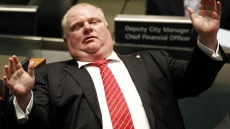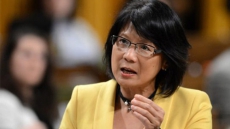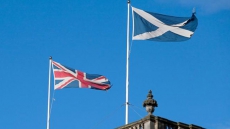VICTORIA - British Columbia's municipalities are paying more than their fair share of policing, housing, waste and water-treatment costs as the federal and provincial governments funnel the financial burden downward, says a report released Thursday.
The report, from the Vancouver-based Columbia Institute, is titled Who's Picking Up the Tab — Federal and Provincial Downloads onto Local Governments and concludes local governments have shouldered about $4 billion in reduced federal and provincial transfer payments.
The release of the report comes just days before B.C.'s municipal politicians gather in Whistler for the annual Union of B.C. Municipalities convention. Premier Christy Clark is scheduled to address delegates Sept. 26.
"In spite of limited means, local governments are picking up more and more services and more and more of the tab," the 44-page report concludes. "Local governments are finding themselves picking up the slack on housing, mental health, addiction, social services, wastewater treatment, diking, flood management, drinking water and recreation infrastructure."
The Columbia Institute Centre for Civic Governance characterizes itself as a charitable organization established to activate and motivate working people to build strong, progressive communities throughout Canada.
Its report states municipal governments rely on two methods to raise money: property taxes and user fees, and they aren't permitted to run deficits. But from 2001 to 2010 sewer-service costs grew 173 per cent, police costs increased 134 per cent, waste-water services costs went up 130 per cent and park, recreation and culture services costs grew 108 per cent.
"Disturbed person" calls to Victoria police increased 356 per cent between 2008 and 2013, and the Vancouver Police Department now employs 17 people full-time for mental illness issues when the same file required 1.5 employees in the 1990s, the report said.
"Mental illness is believed to contribute to 21 per cent of incidents handled by VPD officers and 25 per cent of total time spent on calls where a report is written," the report stated.
Prince George RCMP reports a 40 per cent increase in mental-health calls between 2008 and 2013.
Columbia Institute executive director Charley Beresford said municipalities are struggling to cover the increasing policing-related duties and other services, such as addictions, out of civic duty, but the strain is showing.
"Essentially, we have a situation where senior orders of government ... have both been reducing their commitment to programs and cutting direct grants and the end result is that municipalities are picking up the tab," she said.
Beresford rejected many of the findings of a B.C. government-commissioned Ernst and Young report released earlier this week that took aim at unlimited and unregulated wage policies within municipal governments.
That report said salaries for municipal employees increased by 38 per cent from 2001 to 2012, while government and public-sector salaries rose between 19 and 24 per cent during the same period.
Finance Minister Mike de Jong said in a statement all governments should work together to save tax dollars.
"Municipalities are stepping into the fray," said Beresford. "They're providing excellent services, often for less than the cost of your cable television package and they're dealing with all of these additional services. Anything that suggests that there is less than good service does a misrepresentation of the governance that's happening under local leadership."
The Union of BC Municipalities issued a report last year, Strong Fiscal Futures, that called for a review of the local government finance system, concluding it relied too heavily on property taxes.





